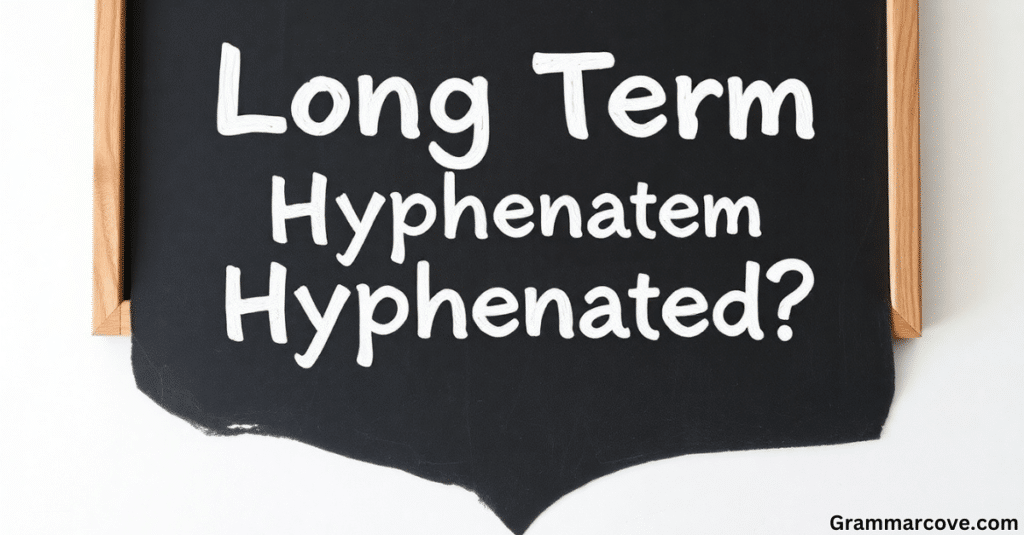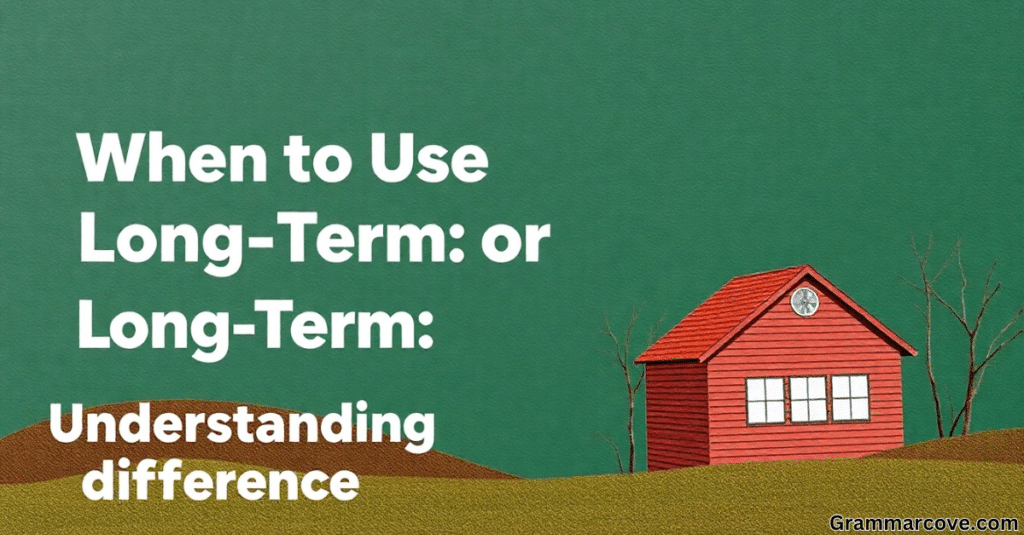When it comes to the terms long term and long-term, writers often find themselves questioning the correct usage. Both forms are commonly seen in professional and casual writing, but the question remains: should “long term” be hyphenated, or not? Understanding the differences between long-term and long term, as well as when to use each form, can make your writing more precise and professional.
In this article, we’ll break down the rules surrounding long-term vs long term, explain the grammatical rules for each form, and provide practical examples to guide your writing. By the end, you’ll feel confident about when and how to use these terms correctly in different contexts.
Long-Term vs Long Term: The Basics
The key to understanding whether to use long term or long-term lies in the distinction between when you’re using it as an adjective versus a noun.
- Long-term (with a hyphen) is used when the term acts as a compound adjective.
- Long term (without a hyphen) is typically used when referring to the concept itself or acting as a noun.
Is Long Term Hyphenated?

You might be wondering: is long term hyphenated? The answer is yes, but only when it’s used as an adjective. For example, when describing a goal, investment, or strategy that spans an extended period, you would hyphenate the term to form a compound adjective.
For example:
- Long-term goals are essential for sustained success.
- She is working on a long-term strategy to improve the company’s market position.
However, if you’re referring to the concept itself, as a noun, you do not hyphenate:
- Planning for the long term requires a lot of foresight.
- He is focused on his long term as an entrepreneur.
Long-Term Definition vs Long Term Definition
The long-term definition refers to an extended period of time or a future timeframe, while long term definition is the noun form, representing the actual concept or idea of planning or thinking over a significant duration.
Let’s look at these in action:
- When you talk about long-term goals, you’re discussing objectives that span years or even decades.
- The long term definition involves a focus on a prolonged period, often when evaluating investments or strategies.
Long-Term vs Long-Term: Adjective vs Noun Usage
A quick way to remember when to hyphenate is by identifying whether the term is functioning as an adjective or a noun.
Long-Term as an Adjective
When long-term describes or modifies a noun, the hyphen is essential to show it’s a compound adjective. This is the most common usage of the term.
Examples:
- Long-term commitment is crucial for building a lasting relationship.
- The company is investing in a long-term solution to its supply chain issues.
- The board agreed to prioritize long-term success over short-term gains.
Here, the hyphen connects the words long and term, indicating they work together as a single unit to describe the noun.
Long Term as a Noun
When long term is used as a noun, you don’t need a hyphen. The term is simply referring to the concept of time.
Examples:
- The long term of the business looks promising.
- We need to prepare for the long term in terms of sustainability.
- He’s thinking about the long term in his investments.
In these examples, long term refers to a period of time, and no hyphen is needed.
When to Use Long Term or Long-Term: Understanding the Difference

The distinction between long term and long-term can sometimes be subtle, but it’s important to get it right to improve clarity in your writing. Let’s take a deeper dive into when to use long-term and long term in different contexts:
1. Long-Term Goals vs Long Term Goals
Long-term goals are specific targets or milestones that are set for a future period that typically spans months or years. These are considered compound adjectives, so they require the hyphen.
Example in an email:
Subject: Setting Long-Term Goals for the New Quarter
Hi Sarah,
I wanted to discuss the long-term goals for the team in the upcoming year. We should focus on strategies that ensure growth over the next 5 years.
On the other hand, long term goals (without the hyphen) could refer more broadly to goals over an extended period, focusing on the concept rather than the descriptive use.
Example in an email:
Subject: Reviewing the Long Term
Dear Mark,
We should consider our long term goals when setting the new direction for the company.
2. Long-Term Investment vs Long Term Investment
When referring to an investment that spans years, you’d use long-term as an adjective to describe the noun investment.
Example in a business report:
Investing in a long-term strategy requires patience, but the rewards are often substantial.
However, when talking about long term investment as a general idea or concept, the hyphen is dropped.
Example in a business report:
We should discuss long term investment opportunities at the next board meeting.
Grammatical Rules for Long Term and Long-Term
To avoid confusion and improve the quality of your writing, it’s important to follow some key grammatical rules:
Hyphenated vs Non-Hyphenated Terms
- Use a hyphen when long-term modifies a noun as a compound adjective (e.g., long-term benefits).
- Do not use a hyphen when referring to the concept or idea as a noun (e.g., planning for the long term).
Examples of Long Term and Long-Term in Sentences:
| Sentence Type | Correct Usage |
|---|---|
| Adjective (describes a noun) | Long-term commitment is essential for success. |
| Noun (refers to the concept) | He’s focused on the long term in his career planning. |
| Adjective (describes a strategy) | Our long-term strategy aims to increase market share. |
| Noun (refers to duration) | I prefer to focus on the long term of our investments. |
Common Mistakes with Long Term and Long-Term

Even seasoned writers can make mistakes with long term vs long-term. Let’s explore some of the most common errors and how to fix them.
Incorrect Usage:
- Longterm investment – Without the hyphen, this term is technically incorrect.
- Long term strategy – When describing a strategy, it should be long-term strategy.
Correct Usage:
- Always use the hyphen when the term acts as a compound adjective modifying a noun.
- Drop the hyphen when referring to the concept or idea as a noun.
Why Use a Hyphen in Long-Term?
The hyphen in long-term serves an important grammatical purpose: it makes the two words function as a single adjective, linking them together. Without the hyphen, it can create confusion by making it seem like the two words are separate concepts rather than describing something together.
For example, the phrase long term goals could be misunderstood as goals that are both long and related to time, but without the hyphen, the term no longer clearly indicates that these goals are meant for a prolonged period.
Planning for the Long Term: Practical Examples
Scenario 1: Business Email Example
Imagine you’re writing to a colleague about a new business strategy.
Subject: Focusing on Long-Term Investment Opportunities
Hi Emma,
I wanted to check in with you about the long-term investment strategy we discussed last week. We need to make sure we’re aligned on our approach to ensure steady growth over the next decade.
In this example, long-term investment functions as a compound adjective, so the hyphen is necessary.
Scenario 2: Setting Long-Term Goals
In an email where you’re discussing professional development, you might write:
Subject: Setting Long-Term Goals for Career Growth
Dear John,
I believe we should set long-term goals for your career progression. Aiming for higher leadership positions is a great target, but it will take time and commitment.
Here, you don’t need a hyphen because you’re referring to long-term goals as a concept.
Conclusion: The Key Takeaways
- Long-term (hyphenated) is used as a compound adjective to modify a noun.
- Long term (non-hyphenated) is used when referring to the concept or idea of a prolonged period of time.
- Stick to these grammatical rules to avoid confusion and improve clarity in your writing.
In professional and casual writing alike, getting these small details right can make a big difference in how your message is received. Whether you’re planning for the long term or setting long-term goals, understanding when to use the hyphen ensures your writing is precise and easy to understand.


